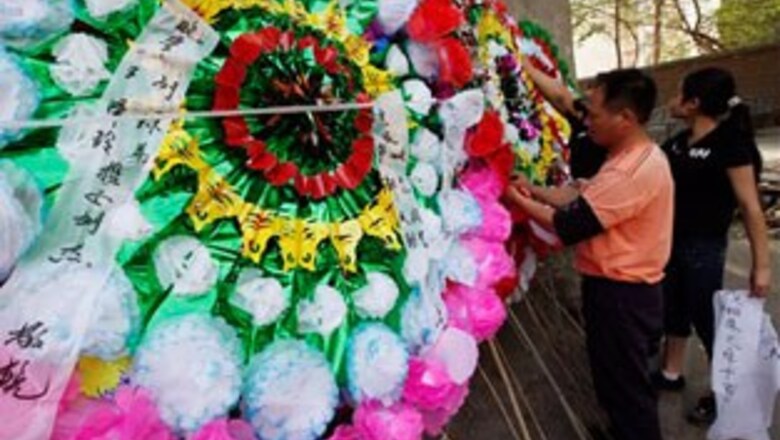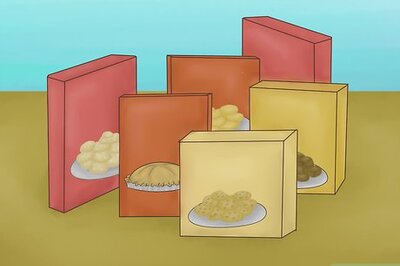
views
Urumqi: A week after the initial violence, China's Urumqi province remained tense, and neither side seemed to know when or how the two ethnic groups of Han and Uighur ethnicity might come to any sense of mutual trust.
Han and Uighur alike are struggling to overcome the resentment exposed by the worst ethnic violence in China in decades, clashes on July 5 that left 184 people dead. On Sunday, the regional Xinjiang government raised the toll of injured that day to 1,680.
The violence began as Uighurs who were protesting the deaths of Uighur factory workers in a brawl in southern China clashed with police in Urumqi. The crowd scattered throughout the city, attacking Han Chinese and burning cars.
Government officials have yet to make public key details about what happened next, including how much force police used to restore order. In later days, vigilante mobs of Han Chinese ran through the city with bricks, clubs and cleavers seeking revenge.
On Sunday, the Xinjiang government raised the injured toll by more than 600 from the previous figure, the official Xinhua News Agency said. More than 900 of the injured remained hospitalized, with 74 "on the verge of death."
State media reported earlier in the week the fatalities included 137 Han and 46 Uighurs, with one minority Hui Muslim also killed. Uighurs say they believe many more from their ethnic group died in the government crackdown.
A member of the Communist Party's ruling Politburo, Zhou Yongkang, toured Xinjiang and urged ethnic groups to come together and "build together a concrete foundation for ethnic unity," according to Xinhua.
But that will prove far harder after the riots laid bare long-standing tensions between Han and Uighurs.
Incense was lit and paper money burned at the funeral on Sunday for a Han Chinese family — a man, his wife and his parents, all killed in last week's ethnic riots. Three Uighur neighbors approached, standing tentatively apart.
Then one of the neighbors grasped hands with a mourning sister, walked to the altar with her and wailed in sympathy.
It was a small gesture of shared grief on a day when Han Chinese mourned their dead and Uighurs dealt with mounting security and surveillance in the regional capital of Urumqi.
The Uighurs, who number 9 million in Xinjiang, have complained about an influx of Han Chinese and government restrictions on their Muslim religion. They accuse the Han of discrimination and the Communist Party of trying to erase their language and culture.
Han Chinese, many of whom were encouraged to emigrate here by the government, believe the Uighurs should be grateful for Xinjiang's rapid economic development, which has brought new schools, highways, airports, railways, natural gas fields and oil wells to the sprawling, rugged region.
Since last week, tens of thousands of Chinese troops have poured into Urumqi (pronounced uh-ROOM-chee) and other parts of Xinjiang to impose order. A senior Communist Party official vowed to execute those guilty of murder in the rioting.
On Sunday, Han Chinese began their rites of mourning, which by tradition start seven days after a death, in spite of a ban on public gatherings issued a day earlier.
At the funeral for the Han man, 39-year-old Zhou Yuxiang, and his wife and parents, colorful wreaths of paper flowers lined the short alley where the ceremony was held. Paper money was burned to honor the dead.
Zhou's 42-year-old sister, who declined to give her first name out of fear, said her only wish was for the survival of her 16-year-old nephew, who is hospitalized in a coma.
"We went to the morgue yesterday to identify the bodies but we could barely recognize their faces because they had been beaten so badly," she said. "Now all I want is for their son to survive. But the doctors said that there's not much hope for his survival."
Even in the city of Hotan, two hours south of Urumqi by plane, where there was no unrest, a large troop presence was visible in the main square, where a huge statue of Mao Zedong shaking hands with a Uighur farmer is on display.
Tourist hotels near the square had no rooms left because security forces had booked them all, one hotel receptionist said.
In Urumqi, armed paramilitary police patrolled People's Square, the site of the July 5 protest, but there were no reports of clashes. Some roads to the main market were still closed Sunday, and the market was guarded by armed military police.
By mid-morning, a helicopter buzzed low over the main bazaar where many Uighurs set up shop. Crowds of shoppers and families stopped in their tracks, nervously watching the chopper before it ascended and flew off.
Ali Mohamad, 36, who sells watermelon outside the market, said he fears the divisions between the two sides will deepen.
"I don't know how long it will be before things improve, but the situation is bad because people think it's not safe here. There's nothing I can do," said Ali, who said he was setting up his fruit stand Sunday for the first time since the riots.
In one of the worst-hit Uighur districts, Wang Yong said rioters had shattered the windows of his small convenience store and set the shop on fire, causing what he estimated as $4,400 to $5,900 in damages.
On Sunday, he was putting in metal shutters. "They give me a sense of security," said Wang, who is Han Chinese.
A Uighur businessman who gave his name as Akbar expressed optimism that the tensions might eventually subside, but for now, he said, trust is a problem.
"They have been afraid of Uighurs," Akbar said of the Han. "And the Uighurs are afraid of the Han people."



















Comments
0 comment